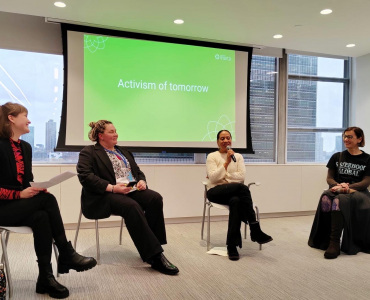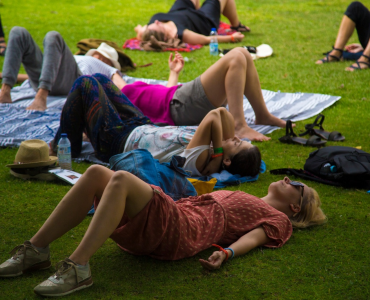
The most recent lenient court judgment in Liepaja, a western-most sea-side town of Latvia, adopting sentences of 240 hours of community service and one year probation period for the two adult men pleading guilty of repeated and prolonged lewd conduct with a minor (5 year old girl) have highlighted the dismissive attitudes towards sex offenders within the Latvian justice system, as well as the impact of these attitudes on the society at large.
The judgment displayed the thorough lack of understanding from the judges and prosecutors on what constitutes sexual offence. This leads to perpetrators of sexual crimes remaining unpunished whilst the victims and their families are left feeling completely powerless.
Liepaja’s case is symptomatic of a wider systemic issue in Latvia
Throughout the last few years in Latvia there have been numerous court judgments where perpetrators of sexual offences against minors have received controversially “light” sentences. Moreover, various members of the criminal justice system, ranging from courts to law enforcement agencies, have publicly expressed opinions in favor of “lighter” sentencing, and on a few occasions even provided excuses for the actions of the perpetrators and/or blamed the victims for the crimes perpetrated against them.
In 2014 Tukums District Court granted prosecutor’s controversial plea for a two-year suspended sentence and three year probation period for the perpetrator of sexual abuse against a five year old girl. Similarly, in December of the same year, in a case of inciting three minor girls to debauchery (sexual offence that may or may not be a direct physical contact), Sigulda District Court sentenced the perpetrator to a 1,5 year suspended prison sentence, with additional obligation to attend offender behavior program. Furthermore, in June 2015, Riga Regional Court sentenced a deputy director of local boarding school to a suspended prison sentence of a year and a half for inciting to debauchery of a minor and an underage person.
Upon evaluation of the reasoning used to justify prosecutor’s plea in these cases, one can easily detect a lack of understanding of the impact of sexual offence on the minor or child. In Liepaja’s case the prosecutor justified her demand for a suspended prison sentence, as “in this case, there was no rape, only lewd conduct”. Similar lack of understanding of the gravity and impact of sexual offences have been shown by various members of law enforcement and courts in last couple years, for example, in 2014 during the debates at the parliamentary committee on Legal Affairs, the chief prosecutor Ms. Elita Jurkjāne stated “in certain cases of rape, it is difficult to call it as such, as the victim is very much to blame for what has happened to her”. After MARTA’s request to evaluate the professional competencies of the chief prosecutor, the Office of General Prosecutor replied “there are some cases of rape, when the victims have encouraged the crime against them through exhibitionist behavior or jointly drinking alcohol, which has led to the rape”.
Research as well as MARTA’s first-hand experience shows that the majority of the children, who have suffered from sexual abuse of any kind, show various levels of emotional and psychological trauma throughout their lives. The sexual violence in any form can cause major emotional, psychological and physical problems that can have long-lasting impact on the quality of life and personal development such as post-traumatic stress disorder, depression, anxiety, and push the survivors of sexual abuse towards destructive behavior and the use of addictive substances.
In some cases the experience of sexual assault can have more grievous impact on child psychological and emotional health than rape, as the lines of consent may be considered “blurred” by the survivor of the assault, the family members and justice system, leading to further guilt and shame. Such feelings are further exacerbated in cases where the perpetrator does not receive a prison sentence. It is especially true in cases of child abuse, when children do not understand fully what has happened to them and often continue to think that they have deserved such behavior or in some why “have asked for it”. Furthermore, the “light” sentences increase tolerance of the society vis-à-vis sexual violence, as it enhances belief that sexual offences and actions leading to depravity of a minor are “nothing special” or a simple “misunderstanding”. The appropriate punishment will enforce understanding that such behavior is unacceptable.
Those working in criminal justice system should be fully aware of the impact their public statements and opinions can have on individuals and the society as a whole, more so in cases of sexual abuse. Prosecutors, judges and members of the parliament are the ones who explain the impact of such crimes to the society at large and in doing so must strengthen the belief that sex-offenders will not get a jail-free card in Latvia. The members of law enforcement and courts should not advocate for “lighter” sentences by arguing that the rape survivors can sometimes be at fault themselves. Such statements enhance the feeling of impunity amongst perpetrators, as well as decrease the reporting of crime by survivors and/or their families.
In view of recent judgments, MARTA calls upon the society and its representatives to recognize the gravity of any type of sexual violence, and advocates for the abolition of suspended sentence as means of punishment for all types of sexual offence.
Current legal framework
The Latvian Law on Protection of Child’s Rights defines sexual abuse as the involvement of a child “in sexual activities that the child does not understand or to which the child cannot knowingly give consent”. These activities can include physical violence and forced sexual acts as well as behavior and activities without a direct physical contact with the child, yet involving sexual gratification on the part of the perpetrator, for example, indecent exposure. It is not clear as to the reasons for the inclusion in the Criminal Law of suspended sentences, community service or even fines in cases of some sexual offences such as inciting a minor to debauchery.
The Articles 159 and 160 of Criminal Law state that the applicable punishment to the perpetrator of rape or sexual violence is the deprivation of liberty for a term of not less than three years. Nevertheless, the Article 162 of Criminal Law states that the applicable punishment against a person who commits leading to depravity of a minor against the will of the minor, is deprivation of liberty for a term not exceeding three years or temporary deprivation of liberty, or community service or a fine, with or without probationary supervision for a term not exceeding three years. The lack of “real” prison sentence may encourage the perpetrators to continue sexual offences (falling under the category of leading to depravity) without fear of being incarcerated.
Finally, the Article 56 of Criminal Law sets the maximum time after the sexual offence when legal proceedings may be initiated. Both MARTA’s and general practice has showed that the individuals are often ready to talk about the experienced sexual abuse in the childhood only as adults – after ten, twenty and more years after the crime was committed. Thus, the current statutes of limitations need to be amended (from 20 years after abuse to 20 years after reaching age of 18) in order to facilitate adult’s ability to pursue perpetrators for the child sexual abuse. Currently, the Article 56 of Criminal Law does not foresee that.
MARTA’s recommendations for better protection of children from sexual abuse:
1. To refute the suspended sentence as means of punishment for all types of sexual assault (make appropriate changes in Article 162 of Criminal Law);
2. To cancel statutes of limitations in cases of sexual assault, when involving minors and under-age children (make appropriate changes in Article 56 of Criminal Law);
3. To avoid public statements by the law enforcement or courts, justifying the perpetrators or blaming the survivors of sexual abuse;
4. To increase general awareness regarding protection of child rights and the impact of sexual abuse among all levels of justice system.

A panel discussion organized by MARTA took place at the NGO Forum and Civil Society Meeting in New York last week. The NGO forum took place from March 5-17 in parallel with the meeting of the 67th UN Commission on the Status of Women. At this event, the MARTA Center provided a safe space to hear the empowering stories of activists and...
2023. gada 22. marts Read more
The Erasmus+ “Heartland” Project has come to a close. "Heartland" was a unique initiative that combines outdoor experiential education, cultural mediation and mindfulness with art expression to help professionals build resilience and overcome challenges in their personal and professional lives. “Youth workers and...
2023. gada 20. marts Read more